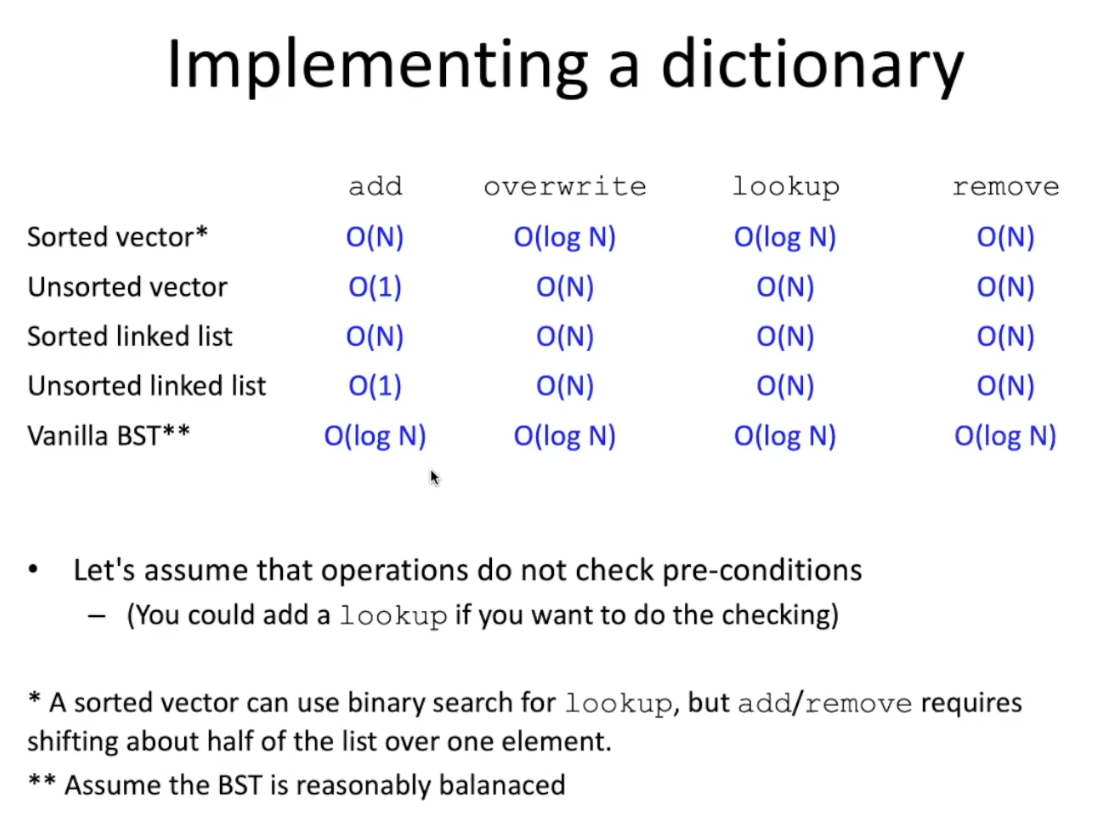Map
A map is a generalized array that consists of key-value pairs. A dictionary is considered to be a Abstract Data Type.
How to implement

Built-in Implementation
C++
Don’t use the square brackets (yet), use the other built-in functions that you can check here: https://en.cppreference.com/w/cpp/container/map
insert something → map::emplace
get something → map::at
map vs. unordered_map
| map | unordered_map | |
|---|---|---|
| Ordering | increasing order (by default) | no ordering |
| Implementation | Self-Balancing Binary Search Tree | Hash Table |
| search time | Average, Worst Case | |
| Insertion time | + Rebalance | Same as search |
| Deletion time | + Rebalance | Same as search |
map<string,int> m;
m["monkey"] = 4;
m["banana"] = 3;
m["harpsichord"] = 9;
cout << m["banana"] << "\n"; // 3You can also initialize like this after C++17
std::map<int, float> m = {
{5, 0.2f},
{6, 0.3f},
{7, 0.3f}
};If the value of a key is requested but the map does not contain it, the key is automatically added to the map with a default value.
map<string,int> m;
cout << m["aybabtu"] << "\n"; // 0The function count checks if a key exists in a map:
if (m.count("aybabtu")) {
// key exists
}The following code prints all the keys and values in a map:
for (auto x : m) {
cout << x.first << " " << x.second << "\n";
}Delete from a map
std::map<char,int> mymap;
std::map<char,int>::iterator it;
// insert some values:
mymap['a']=10;
mymap['b']=20;
mymap['c']=30;
mymap['d']=40;
mymap['e']=50;
mymap['f']=60;
it=mymap.find('b');
mymap.erase (it); // erasing by iterator
mymap.erase ('c'); // erasing by key
it=mymap.find ('e');
mymap.erase ( it, mymap.end() ); // erasing by rangeSome other small insights
Recently discovered that you don’t need to do this when counting.
// NOT NEEDED
if (m.count(x)) {
m[x]++;
} else {
m[x] = 1;
}
// DO THIS INSTEAD
m[x]++;I keep forgetting this for time to time
unordered_map<pair<int,int> int>does not exist. The hash function for apair<int,int>is not defined.
Implementation in Python
Unordered Map
In Python, the map is just a dictionary. This is an unordered map
a = {}
a['hi'] = 5
# Iterate over keys
for key in unordered_map:
print(key)
# Iterate over key-value pairs
for key, value in unordered_map.items():
print(f"{key}: {value}")Ordered Map
Use SortedDict
from sortedcontainers import SortedDict
sorted_map = SortedDict()
sorted_map['b'] = 2
sorted_map['a'] = 1
sorted_map['c'] = 3
print(sorted_map) # Output: SortedDict({'a': 1, 'b': 2, 'c': 3})
# Iterate over keys
for key in sorted_map:
print(key)
# Iterate over key-value pairs
for key, value in sorted_map.items():
print(f"{key}: {value}")Competitive Programming
The hash function can be reverse engineered to produce lots of hash collisions. https://codeforces.com/blog/entry/62393
- Therefore, preferable to use a regular
map